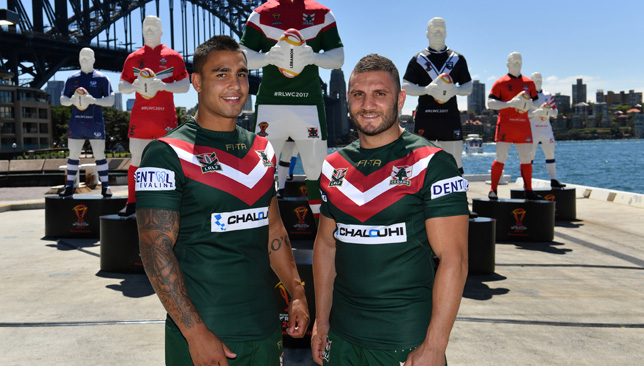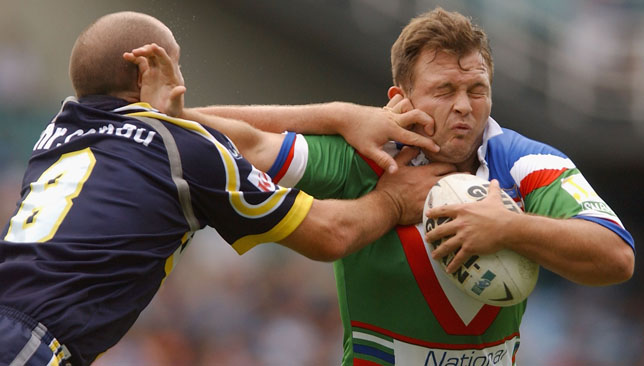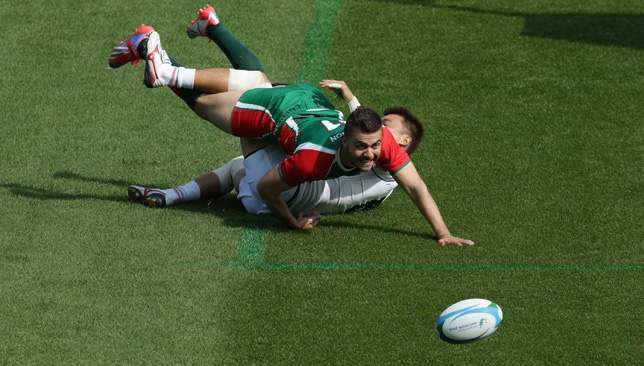
When the Lebanese Rugby League first tried to introduce the game to the country in the early 2000s they discovered a problem.
“A lot of fights,” explains Remond Safi, the CEO of the Lebanese Rugby League Federation (LRLF).
“Because of the contact, fights kept breaking out all the time. We had to make them understand the game – that what happens on the field stays on the field.
“This is a contact sport and these are the rules you have to stick by or else you can’t play the game.”
But this was just one hurdle to overcome in an extraordinary journey that has now taken Lebanon to their first Rugby League World Cup (RLWC). [A Lebanese team did compete in the 2000 RLWC but the team was organised by an association based in Sydney].
The rise of Lebanese Rugby League actually began in the inner west suburbs of Sydney back in the late 1990s.
“(Rugby League in Lebanon) is a very strange mix” explains Safi, “because the country didn’t know the game at all until it started in Australia in 1997 with the players of Lebanese heritage.”
Canterbury-Bankstown was an area that many Lebanese families who immigrated to Australia in the 1970s settled in. According to the latest census data from the Australian Bureau of Statistics, 71 per cent of the nearly 79,000 Lebanese-Australians live in Sydney. Around 20,000 Lebanese live in a small patch of suburbs in south-west Sydney bordered by the M7 Motorway, Parramatta Road, Canterbury Road and the M5 Motorway – Canterbury-Bankstown.
Greenacre, with 3,389 Lebanese residents, is officially known as “Little Lebanon”.
The area boasted a very strong league club, the Bulldogs, and as the sons of the immigrants grew up they began to be attracted to this strange game in their new home.
Their hero was Hazem El Masri, the Bulldogs’ goal-kicking fullback and the highest points scorer in NRL history with 2,418.

“El Magic”, as he is known, was born in Tripoli and emigrated to Australia when he was 12. He was the captain of the Lebanese side at the 2000 RLWC and many of Lebanon’s players in this year’s League’s long journey from Bondi to Beirut tournament were inspired to take up the game after watching him play for the Bulldogs.
The growth of the game in Lebanon can directly be traced to that RLWC appearance in 2000. After that the beginnings of a local league began to take shape. Safi was there from the beginning.
“With a lot of difficulties,” he replies when asked how they set up the first competition. “We had an international development officer at the time who was there to start up the game, and a few other western minds as administrators.
“They were able to set it up and not take no for an answer from everybody they spoke to. That was their motto: ‘You have to try it before you say no to it.’”
After those humble beginnings the LRLF now has “just under 1,000 players”.
“There is currently a national championship with six clubs registered, five are active in that championship,” Safi continues. “You’ve got 11 university teams playing in two divisions. We have two regions playing in school championships with ages of 14, 16 and 18. We’ve also got three women’s teams and another two are being formed.”
Setting up the women’s league was again a challenge.
“It was a bit difficult at the beginning stages with our culture,” Safi says. “Having women play a sport and especially a contact sport. “But we’ve overcome those barriers and they are well on their way. They played already under the Junipers name and they played their first international match this February against Italy.”

This RLWC campaign is the fruition of many years of hard work.
“This is the first RLWC officially as a federation out of Lebanon,” continues Safi. “The first one officially under the auspices of the Sports Ministry.”
The Lebanon squad includes 11 NRL stars of Lebanese heritage, including Parramatta star Mitchell Moses and Canterbury hooker Michael Lichaa. Former New South Wales hooker Robbie Farah was named as their captain.
The rest of the squad are players from the Queensland or NSW state leagues, the competitions underneath the NRL.
Lebanon will be coached by former Australia half-back Brad Fittler, the man tipped to be appointed the new NSW State of Origin coach.
Five Lebanese-based players have been included in a larger squad, and one is actually part of the 24-man playing group – Raymond Sabat from Lycans FC in Beirut. Safi says Sabat has been included on merit.
“Whether he gets a starting position in the 17 (match day squad) is up to the skill level and the coach,”
says Safi.
“Raymond has been playing since he was 12. Most of the local Lebanese players who have come in to camp have been with us for a while and been through the system.
“Two of the players have gone through the age system we have in Lebanon, the Under-16, U18 and U20 and the Cedars. So they have played in all national teams in Lebanon.”
Safi is hopeful of a good performance by the team in Australia ahead of Sunday’s opener against France.
“There is a very strong chance we can make the quarter-finals,” he says. “But it all depends on what happens in that 80 minutes, how switched on our players are and how disciplined they will be.”
A strong performance in the RLWC will further strengthen the game in the region. “There is a huge plan and a strong strategy to set up the game in the Middle East and Africa (MEA) with my other role as the MEA regional director for the Rugby League International Federation (RLIF),” adds Safi.
“And we’re doing that using Lebanon’s model and coaching staff to assist in educating and developing the game.”
Plans include growing the game in South Africa, Burundi, Kenya, Cameroon, Ghana, Siera Leone, Ethiopia, Congo, Morocco, the UAE (currently suspended) and Turkey with activities also in Tunisia, Algeria and Qatar.
“Our challenges are to find the manpower to increase the demand of participating teams,” he says.
“You need to provide a certain quality of coach in order to establish and develop and continue to embed a culture for these new teams. Also to find a way for players when they graduate from university not to leave the country.”
The LRLF have also organised a way for people of Lebanese heritage around the world to get behind the team during the tournament, buying global membership pack online. “We’re trying to build and start preparing ourselves for the next World Cup which is in England (in 2021). By becoming a member you get updated on what we’re doing and what we’re up to,” said Safi.
To buy a membership pack go to www.lebanonrl.com.